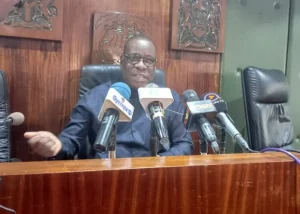The British High Commission in Abuja has reaffirmed its commitment to supporting Nigeria’s energy transition, emphasizing the importance of collaborative efforts to achieve sustainable energy goals. During a recent visit to the Nigerian Upstream Petroleum Regulatory Commission (NUPRC), Ms. Samantha Harrison, the First Secretary for Climate Diplomacy, underscored the United Kingdom’s dedication to partnering with Nigeria on climate and energy initiatives, particularly in reducing gas flaring, a key element of Nigeria’s decarbonization strategy. This commitment signifies a strong alliance between the two nations in addressing the pressing global challenge of climate change and promoting sustainable development in Nigeria’s crucial energy sector.
The meeting between the British High Commission and the NUPRC served as a platform for exploring collaborative opportunities to curb gas flaring and advance Nigeria’s decarbonization agenda. The discussions focused on leveraging the UK’s expertise and resources to support Nigeria’s efforts in mitigating the environmental impact of gas flaring while simultaneously unlocking economic potential. The NUPRC, as the regulatory body responsible for the upstream petroleum sector, highlighted its commitment to implementing effective strategies to address this issue and transition towards a cleaner energy future. The engagement signifies a shared understanding of the urgency and importance of transitioning to a more sustainable energy landscape.
Gbenga Komolafe, the Chief Executive of the NUPRC, outlined a dual-pronged approach to combat gas flaring, emphasizing both the decarbonization of existing flare sites and the conversion of flared gas into valuable economic resources. This strategy aims to not only minimize environmental damage but also to generate additional revenue streams for the nation. Komolafe highlighted the Nigerian Gas Flare Commercialisation Programme (NGFCP), a key initiative encompassing 49 identified flare sites, as a central component of this approach. The NGFCP aims to harness previously wasted gas resources and channel them into productive uses, contributing to both environmental sustainability and economic growth, aligning with the broader goals of resource optimization and sustainable development.
The NGFCP represents a significant step towards achieving Nigeria’s decarbonization targets by converting a harmful byproduct into a valuable resource. By capturing and utilizing flared gas, the program aims to reduce greenhouse gas emissions, improve air quality, and generate revenue that can be reinvested in further sustainable development projects. The program also has the potential to create new jobs and stimulate economic activity in communities impacted by gas flaring. The involvement of international partners like the UK underscores the global significance of this initiative and its potential to serve as a model for other gas-flaring prone regions.
The NUPRC acknowledged the support received from multilateral organizations such as the World Bank and Net Zero World, emphasizing the importance of international collaboration in driving decarbonization efforts. The commission expressed optimism about future partnerships with the British High Commission, recognizing the UK’s expertise and resources as valuable assets in further advancing its decarbonization agenda. This collaborative approach highlights the recognition that tackling climate change requires a global effort, leveraging the strengths and resources of various nations and organizations.
The meeting between the NUPRC and the British High Commission delegation included a technical session aimed at fostering a robust partnership to support Nigeria’s energy transition. This signifies a commitment to moving beyond general discussions and delving into practical solutions and technical collaborations that can accelerate progress towards shared goals. The technical session likely involved experts from both sides, sharing knowledge and best practices related to gas flare reduction, renewable energy integration, and other relevant areas. Such technical exchanges are crucial for developing effective strategies and implementing concrete actions to achieve meaningful results in the pursuit of a sustainable energy future for Nigeria. The partnership underscores the understanding that effective climate action requires not only policy commitments but also practical, on-the-ground solutions facilitated by technical expertise and knowledge sharing.













